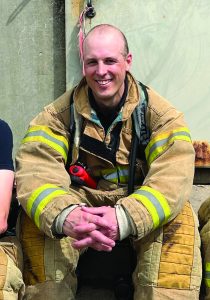As a fire service member of 18 years, Mandee Marx is highly invested in her work as a peer supporter through MnFIRE. She says, “supporting mental health and resilience is just as important as the work we do on the front lines.”
Learn about Mandee’s role with MnFIRE’s Peer Support Program and how being there for fellow firefighters has taught her no one should carry the weight of this job alone.
Tell us about yourself, your history with the fire service and who you are outside of your role as a firefighter.
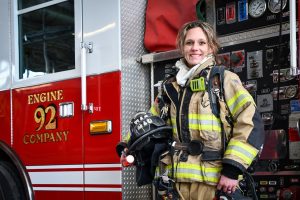
Over my 18 years in the fire service, I’ve served in three different communities. In 2007, I began my fire service journey with the Long Lake Fire Department and then moved to Byron in 2014 and became the first female firefighter within the department. Now since 2017, I’ve worked full-time for the Rochester Fire Department.
I am the proud wife of a dedicated police sergeant – yep, we’re a police/fire house! There’s never a dull moment, which can come with its own unique set of challenges! I am also mom to three kids. When I am not serving my community, I love being outdoors and watching my youngest daughter, age 16, play in goal for her hockey team.
When and why did you become a MnFIRE peer supporter?
I became a peer supporter in 2015 because I understand firsthand the unique challenges firefighters face on the job and at home. Being there for my sisters and brothers in the fire service and helping them navigate tough times is my way of making sure no one feels alone.
What are the most rewarding and surprising parts of your role as a peer supporter?
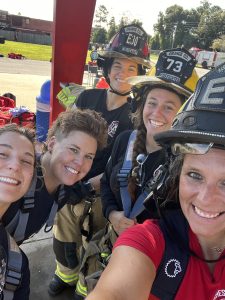
The most rewarding part of being a peer supporter is knowing that I can make a real difference just by being present and listening. Seeing someone feeling less alone and more understood is incredibly meaningful. What surprised me the most was how the role has also given back to me. Walking alongside others through their challenges has strengthened my own resilience and deepened the bonds I share within the fire service, reminding me that we were never meant to carry the weight of this job alone.
What should others who want to become a peer supporter know? And what qualities do you think make a good peer supporter?
As peer supporters, our role is to simply be there for fellow firefighters – to listen, understand and offer support when life gets tough. Offering them a safe space where they can share their thoughts and know that they are not alone. Sometimes it’s just listening while other times it’s connecting them to additional resources.
A great peer supporter is someone who firefighters can trust to listen without judgment and offer guidance and support during tough times. As a peer supporter, we are not there to “fix” the other person. We are there to listen and support them. We also need to take care of ourselves so we’re able to be fully present when someone needs us.
What are some of the ways you keep yourself healthy mentally and physically?
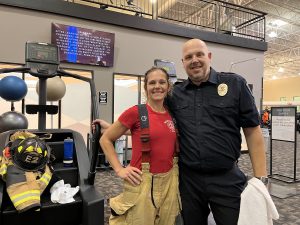
Physically, I go for runs outside and try to stay active. I do my best to eat healthy and get sleep when I can. I’ve also learned that it’s ok to say no and set boundaries. As a peer supporter, I want to be there for those who need me but if I am overwhelmed and struggling, I can’t be the peer they need.
What advice can you offer fellow firefighters who may be struggling with their mental health? What are some strategies/practices that may help?
It’s ok to not be ok. If you find yourself struggling, talk with someone you trust, don’t try and fight through these demons alone. Many of us face the same battles and reaching out for help is a sign of strength, not weakness.
When I become overwhelmed and start to feel like the job is taking over my life, I hit pause and do something that brings me joy and helps reset my mind.
What do you see as the most valuable component of the Hometown Heroes Assistance Program?
The most valuable component of the program is connection. MnFIRE connects a struggling firefighter or their family member with someone who truly understands the unique stresses of the job and listens without judgment. Having a shared experience builds trust and reminds firefighters they are not alone. Sometimes a simple, “Are you ok?” can make all the difference.
Help is just a call away.
MnFIRE Peer Support is a safe, confidential space to talk about hardships. Minnesota firefighters and their family members can get connected by calling our 24-hour helpline at 888-784-6634 and selecting option 2.

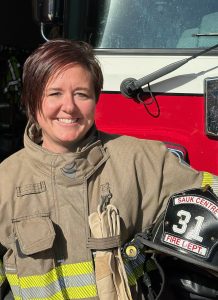 I am a lifelong Sauk Centre resident. I’ve been married to my husband Kelly for 23 years. We have three adult daughters, Greta (22), Ellen (20) and Ava (19). My hobbies include gardening, cheering on the Minnesota Twins, and drinking coffee/socializing with friends. My full-time career is a 911 Dispatcher for the Douglas County Sheriff’s Department in Alexandria, MN. I’ve been dispatching for eight years.
I am a lifelong Sauk Centre resident. I’ve been married to my husband Kelly for 23 years. We have three adult daughters, Greta (22), Ellen (20) and Ava (19). My hobbies include gardening, cheering on the Minnesota Twins, and drinking coffee/socializing with friends. My full-time career is a 911 Dispatcher for the Douglas County Sheriff’s Department in Alexandria, MN. I’ve been dispatching for eight years.